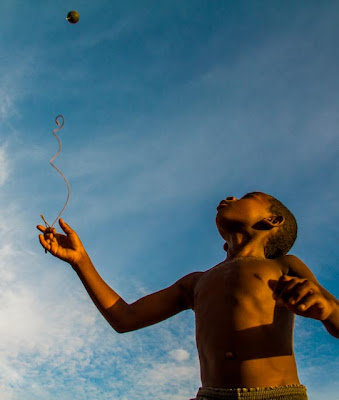OK, so if you've been reading this blog, hopefully you know we try to do some sort of volunteer work at least once a week wherever we are. It's not a monumental goal, nor is it going to change the world. We realize this.
Last week, doing our "1 of 7," as we like to call it, we experienced something we thought was pretty nice.
We had found our own little paradise--a beach hut for $10 per night (whoo hooo!), complete with front porch, hammock, and ridiculous views, all on a remote island in the Philippines where few foreigners visit except during surf season, which it wasn't. There were even seashells out front for Liz to collect and water buffalo out back for Kip to take pictures of!
The only problem was the beach was scattered with trash. Most of it came in with the tides, but some also fell from the hands of locals, many of whom still think tossing their chip bags, food wrappers, and cigarette butts in the sand is acceptable behavior. A few folks even call the plastic bag the "Filipino Jellyfish" for its prevalence and appearance when found in the water or washed up onshore.
After breakfast and a less-than-stellar surf session, we grabbed a few plastic bags and hit the beach to start a clean up. Side note: You may have noticed picking up trash has been a go-to activity for us; there's litter everywhere, it's easy to collect, and cleaning it up makes an immediate impact, especially in tourist areas; if only we could figure out how to get people to stop littering. Hmmmmm.
After half an hour or so, a graying man and younger boy in board shorts walked down the empty beach toward us. Looking closely, it appeared as if they both were carrying plastic bags and that they were picking up trash as they walked.
Helpers? Indeed, it was.
The man's name was John. He was an expat American living in the Philippines, and he and his Philippine-born son, Kenji, had seen us and wondered if they could lend a hand.
"Of course," we told them, "we'd love to have the help." So father and son joined in, and, together, we walked along talking and filling our bags.
John said he hoped this would be a good lesson for Kenji, who spent hours on the beach or on the waves nearby. He also thought it may help convince some of the locals who'd been watching us to stop littering and maybe even consider cleaning up after others who weren't as conscientious.
It was nice to imagine.
After emptying our bags in a nearby trash can, we shook hands and parted ways. And then we got back to enjoying what we felt was our own little slice of paradise...



.jpg)




























.jpg)



